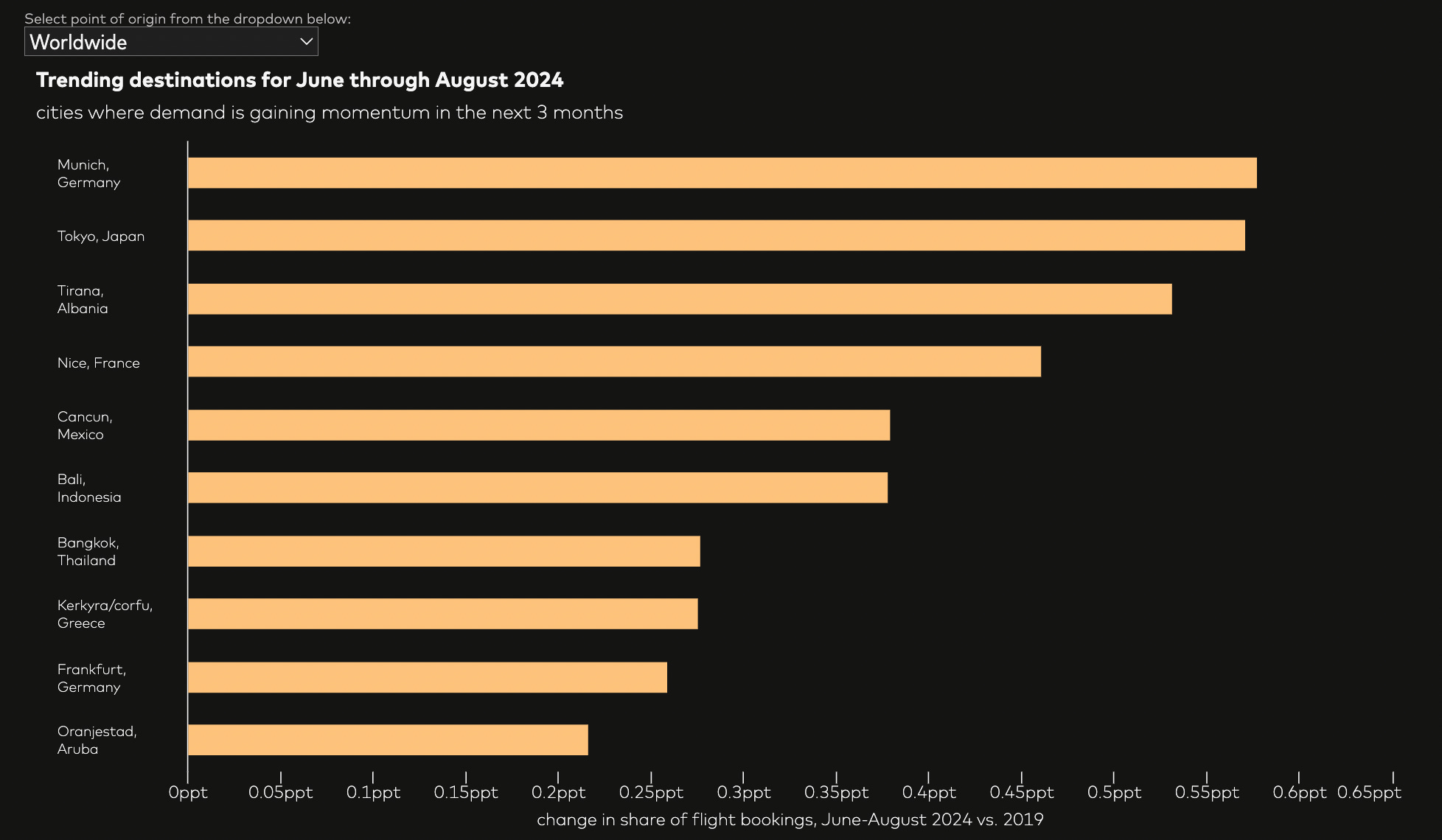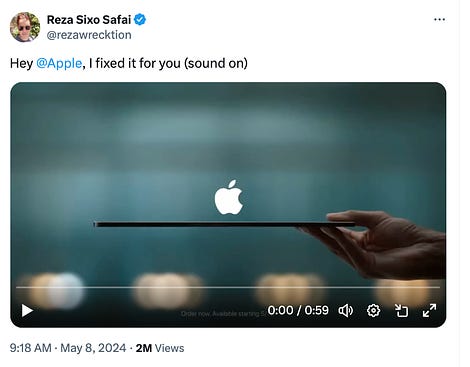As you'll see in several stories in this issue, Big Tech is going all-in on travel. Despite their dominance, plenty of opportunities remain for startups to innovate, carve their niches, and become the Travel Big Techs of tomorrow. Thanks to OAG for sponsoring this newsletter
0. The most clicked link in the previous newsletterThe most clicked link in Travel Tech Essentialist #143 was Morgan Stanley's recent report Generating your AI Itinerary. 1. How AI will reinvent MarketingIn How AI will Reinvent Marketing, Andrew Chen, General Partner at Andreessen Horowitz, discusses the future of marketing as AI integrates into every aspect of technology. First-order effects of inventions are easy to predict, but secondary, tertiary, and n+1 effects are very hard. When the iPhone launched, it was seen primarily as a revolutionary phone, camera, and internet browser. Few could have predicted it would enable the gig economy, social media influencers, or revolutionize entire industries like transportation. Similarly, AI's long-term impacts on marketing will likely be far more profound and unpredictable than we can currently imagine. Chen discusses what he calls "boring examples” (i.e., first-order effects) of AI in marketing, such as creating numerous ad variations, cheaper content production, and embedding ads in LLM-generated answers. He then moves on to consider what the secondary or tertiary-order effects could be in Marketing as a result of AI giving us infinite labor, infinite content, and mass personalization. A few of the possible consequences that Chen goes into some detail:
2. Travel AI ParadoxesRod Cuthbert (founder of Viator) did not mince words as he addressed Google's growing dominance in travel and the looming threat of a 'super app' fueled by AI, which could fundamentally disrupt the OTA's business model. Read + Rod also spoke about the paradox of AI-powered local recommendations, which I thought was particularly interesting:
Here are other paradoxes that AI could bring to the travel sector:
Future advancements in AI could potentially invalidate these paradoxes as the technology evolves and adapts to new challenges and opportunities. Feel free to share more paradoxes if you have them! 3. Mastercard’s travel data reportAccording to the Mastercard Economics Institute’s latest travel report, the travel sector is on course for a record-breaking year in 2024 in terms of spending and the number of people traveling. The report takes a deep dive into evolving travel trends globally and provides detailed country-specific insights. Some highlights include:
4. Meta Quest Travel Mode: OnEarlier this week, Meta launched a Travel Mode feature for Quest 2 and 3, converting the headsets into in-flight entertainment devices. This feature allows users to watch movies, play games, and work in a virtual environment that feels like they're in front of a large screen. It stabilizes viewing on flights and is planned for other transport modes too. In collaboration with Lufthansa, Meta is testing this technology on select flights for customers of the new Lufthansa Allegris Business Class Suite, providing pre-loaded Quest 3 headsets. Here is Zuckerberg demoing Travel Mode in an IG post.
5. $105 Billion bill for US Air Travel improvementsThe US Senate passed a civil aviation bill to improve US air travel, and the House of Representatives is now set to consider the legislation. The bill allocates $105 billion over five years to improve airport infrastructure and the Federal Aviation Administration, impacting over 40,000 employees. The legislation ensures consumer protections, such as mandatory ticket reimbursements for travel disruptions, and introduces provisions to make air travel easier for passengers with disabilities. It also includes enhanced runway safety measures like ground-based warning systems at major airports and advanced cockpit alert systems to prevent collisions. Read + WSJ. This substantial investment and new regulatory obligations will create opportunities for new and established startups in sectors such as airline and airport technology, insurtech, customer service, and back-office operations. If you read this, please participate in this week’s poll at the end of this newsletter 🙏 6. The world is flat and getting flatterApple faced serious backlash from their recent ad, which showed musical instruments and paint bottles being destroyed and replaced by their super thin iPad Pro. Apple's VP of Marketing was quick to issue an apology. Ben Thomson wrote an insightful article in which he mentions that the ad couldn’t have hit the mark more squarely. He argues that, according to Aggregation Theory, digital transformation has shifted the power from distributing scarce goods to facilitating the discovery of desired content. This shift has led to a level of accessibility where everything is readily available, resulting in a flattened hierarchy of content and services:
Technology has only continued to accelerate this flattening:
The only way that the Apple ad could have driven the flattening point more squarely would have been to play the ad in reverse, as Reza Sixo Safai pointed out on X:
The new ultra-slim iPad Pro ad reminded me of a couple of funny takes on the trend of shrinking tech products. One is the movie Zoolander (2001), where the protagonist uses an absurdly tiny flip phone. The other is a Saturday Night Live skit (2008) featuring “Steve Jobs” unveiling the iPod Micro, iPod Pequeño, and the invisible iPod Invisa, each more comically smaller than the last.
7. A different kind of Trip Advisor
The interest in using psychedelics for mental health has grown in recent years:
Most psychedelic therapies are not legal in the West. But there is a rising popularity of psychedelic retreats in countries such as Mexico, Jamaica, Costa Rica, the Netherlands, and Australia, where it is either legal or in legal limbo. Many expect that psychedelics will go mainstream in the near future. There is a lack of integration and aftercare for psychedelic-assisted therapy experiences, and this could present a great opportunity for the emergence of psychedelic concierges, according to Trends.
8. The impact of Google’s Helpful Content Update on travel publishersJames Brockbank from Digitaloft analyzed the impact of Google's Helpful Content Update (HCU) on the travel publishing sector. HCU was rolled out in August 2022 and by May 2024, 78% of the 671 travel sites reviewed experienced a drop in organic traffic. Sites like Timeout.com (+56%), LonelyPlanet.com (+133%), and Fodors.com (+309%) saw major traffic increases, while others like PlanetWare.com (-89%), TheCultureTrip.com (-69%), and Thrillist.com (-68%) experienced sharp declines. This update aims to prioritize human-generated content over AI-produced content, enhancing the quality by focusing on user needs rather than just search engine optimization. However, the significant traffic losses raise concerns about the update's fairness and real-world effectiveness. Read +
9. Big week in Gen AI and TravelThis week saw major breakthroughs in generative AI in travel. Christian Watts, Magpie founder & CEO, wrote about the three major announcements:
10. Premium seats
My two favorite comments to this question and the beautiful video:
PS. Community PollThe poll in the previous newsletter -Who do you think will lead in travel transaction volume in 10 years?- had Booking.com as the leading answer (29%), followed by Google (23%), an AI-native search engine (19%), an AI-native OTA (18%), and Airbnb coming last at 10%. This week’s poll refers to the $105 Billion bill for US Air Travel improvements (see #5 above). Who do you think will be the main winners if this bill passes?
Are you fundraising?If you are a startup looking to raise a round (from pre-seed to Series D), I can help (for free). Travel Investor Network is a private platform where I recommend innovative travel startups to investors and innovators. If you’re interested, please start by completing this form. Travel Tech Essentialist Job BoardExplore the 1362 open positions on Travel Tech Essentialist’s curated Job Board and stay ahead of the curve by subscribing to job alerts. Here’s a tasted of the jobs on the board:
→ Join the Talent Network. Hiring companies sometimes ask me to help them find the best talent. If you want me to have you on my radar to introduce you to the right opportunities, join the new Talent Network (it takes 3 minutes). → If you're contemplating a career move, simply curious, or an HR professional seeking job insights, subscribe to my Travel Tech Jobs newsletter. If you like Travel Tech Essentialist, please consider sharing it with your friends or colleagues. If you’re not yet subscribed, you can do so here: And, as always, thanks for trusting me with your inbox. Mauricio Prieto |
viernes, 17 de mayo de 2024
Travel Tech Essentialist #144: Big Tech
Suscribirse a:
Enviar comentarios (Atom)







No hay comentarios:
Publicar un comentario